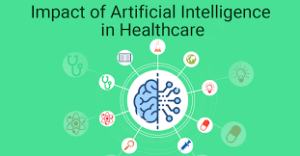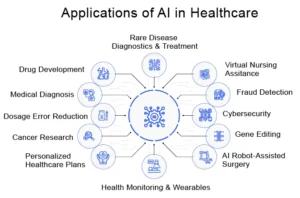Explore the AI-driven revolution in healthcare, from precision diagnostics to personalized treatments, as we delve into the transformative role of Artificial Intelligence, shaping a patient-centric future in the realm of medical innovation.

In an era marked by technological leaps, Artificial Intelligence (AI) has emerged as a game-changer, reshaping various industries. Among these, healthcare stands out as a sector where AI is proving to be a transformative force, leading the charge towards smart healthcare. This article explores the crucial role AI plays in patient well-being, analyzing its far-reaching impact, diverse applications, and the innovative possibilities that lie ahead.
Decoding AI in Healthcare:
AI, in its essence, refers to computer systems designed to perform tasks that traditionally necessitate human intelligence. Within healthcare, this translates into a spectrum of applications aimed at elevating patient care, refining diagnostics, and streamlining medical processes. The integration of AI in healthcare signifies more than just a passing trend; it signifies a paradigm shift in how we approach wellness and medical treatment.
Impact of AI on Healthcare:

- Precision Diagnostics: AI algorithms meticulously analyze extensive datasets, including medical records, imaging, and genetic information, aiding in accurate and prompt diagnostics. This precision not only reduces the margin of error but also leads to more effective and timely treatments.
- Personalized Medicine: Through the power of AI, healthcare providers can customize treatment plans based on an individual’s unique genetic makeup, lifestyle, and medical history. This approach maximizes treatment efficacy while minimizing potential adverse effects.
- Predictive Analytics: AI models excel in predicting disease trends and outbreaks by discerning patterns within healthcare data. This capability proves invaluable for proactive healthcare management and efficient resource allocation.
- Remote Patient Monitoring: With the advent of wearable devices and IoT technology, AI facilitates remote patient monitoring. Real-time data analysis allows healthcare professionals to track patients’ vital signs and intervene promptly in case of anomalies.
AI Applications in Healthcare:

- Medical Imaging: AI algorithms enhance the interpretation of medical imaging, assisting radiologists in identifying abnormalities in X-rays, MRIs, and CT scans. This not only expedites diagnoses but also reduces the likelihood of oversight.
- Drug Discovery and Development: AI accelerates the drug discovery process by scrutinizing complex biological data. This expedites the identification of potential drug candidates and enhances the efficiency of clinical trials.
- Virtual Health Assistants: AI-powered virtual assistants provide personalized health advice, medication reminders, and even mental health support. These tools foster patient engagement and adherence to treatment plans.
- Robotic Surgery: AI-driven robotic systems aid surgeons in performing intricate procedures with precision and minimal invasiveness. This not only improves surgical outcomes but also shortens recovery times.
Thinking Innovatively:
- Emotional AI for Mental Health: AI is now employed to analyze speech patterns and facial expressions to gauge emotional well-being. This technology holds promise in early identification of mental health issues and tailoring interventions accordingly.
- Blockchain for Healthcare Data Security: The fusion of AI with blockchain technology enhances the security and privacy of healthcare data, ensuring that sensitive patient information remains safeguarded from unauthorized access.
- AI in Genomics: The convergence of AI and genomics opens avenues for personalized medicine at an unprecedented level. AI can scrutinize vast genomic datasets to identify potential genetic markers for diseases and recommend targeted interventions.
The Future Landscape:
- Human-AI Collaboration: The future of healthcare hinges on a seamless collaboration between humans and AI. AI can manage routine tasks, allowing healthcare professionals to focus on complex decision-making and patient care.
- Continuous Learning Algorithms: AI algorithms will evolve with continuous learning, adapting to new medical discoveries and treatment modalities. This adaptability ensures that AI remains at the forefront of medical innovation.
Smart healthcare, propelled by AI, is not a distant vision but a present reality reshaping the patient care landscape. From precision diagnostics to revolutionary treatment modalities, the impact of AI is profound and multi-faceted. As we navigate this transformative journey, the possibilities seem boundless. Embracing the potential of AI in healthcare is not merely a technological leap; it signifies a commitment to a future where patient well-being takes center stage in the ongoing saga of medical innovation.